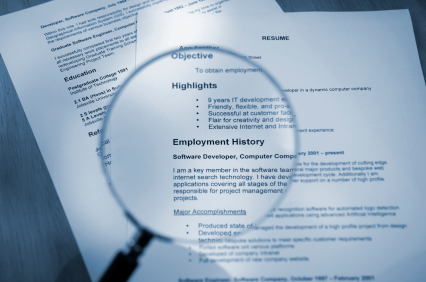At some point in your life, you will realize you need a resume. At that point, you will probably find yourself unusually irritable. It’s a daunting task, and if you are starting from scratch, you probably think welfare sounds better than job hunting. You realize you either have too much or too little to put on there. If you already have a resume, you probably don’t feel like updating it because everything barely fits as it is or you can only stretch what you did so much to fill up the entire page. I’ve been down both roads.

I’ve seen the whole spectrum of resumes—from half-page blurbs to 10-page sagas. The general rule of thumb is a one-page resume if you have less than ten years of experience. Can it be longer than a page? Sure, but I think highlighting your experience on one page is the best solution. When you’re reading resumes, the last thing you want to do is read a career novel in bullet form. So, here’s my list of nine tips to make sure you’re resume stands out in the crowd.
- Maximize your moniker. The most important thing on your resume is your name. I’m not sure why so many people have their name just big enough to ignore. Think about it: would you hire someone whose name you can’t remember? Bold it. Underline it. Italicize it. (Just not all three). Jack that font size up to 72 (or at least bigger than 20) and get your name out there. It’s how people will remember you.
- Abstain from objectives. You want “to pursue a career that allows you to facilitate your skills in an environment conducive for blah, blah, blah.” See? You’re bored just from reading that. I hate to break it to you, but employers don’t really care what you want. Their only concern is what you have to offer. The resume reader knows you are trying to get a job—that’s why they have your resume. Axe the objective. Get to the point.
- Order the important. Resumes are normally arranged in reverse chronological order; however, if you’re applying for a job as a blogger and your most recent work experience is as a painter, that’s probably not the best place to start. Start with your most relevant experience for the position you’re applying for. Simply explain in your cover letter you listed your experience by relevance rather than date. They’ll love that you edited your resume for that job (even if you didn’t).
- Fix your font. Someone once told me, “You’re cooler than Times New Roman.” It’s true (or at least I’d like to think so). If you’re still using the Microsoft Word default font, change it. There are all kinds of readable, elegant, inspiring fonts out there (like my personal favorite, Lucida Bright). Use a font that stands out in the crowd. Times New Roman won’t resent you, I promise.
- Value your verbs. Dig out that thesaurus. Highlight the work you did by starting with some robust verbs. You didn’t file, you organized. You didn’t pass out papers, you administered them. Use words that are relevant to the position your applying to, and don’t use the same word twice. Think of it is a game. When you need some help off the bench, go here.
- Crunch the numbers. Be extremely specific in your job history and point out specific numbers. Don’t say “Sold t-shirts.” Say “Marketed and sold over 1,000 t-shirts in two months.” Don’t say, “Saved the company money.” Go with “Saved $70,000 by utilizing an Excel spreadsheet instead of a legal pad” instead. The numbers will speak for themselves, and they’ll jump right off the page.
- Style your sheet. I’d venture to guess that 90 percent of resumes since the invention of the typewriter have been centered. It’s played. Change up your formatting. Utilize the white space, spread it out, move things around. It takes some time, but submitting a resume with a unique design will help you float to the top of the resume pile
- Fill in the gaps. Don’t be deceived: you are allowed to put more than just work experience on your resume. If you volunteer, slap that on there. If you’ve written scripts for school plays or performed monologues at your church, don’t undervalue that. Even if you don’t think singing in the shower is relevant (ok, it’s probably not), someone else might. There are all kinds of unique ways to fill in a somewhat empty resume. I’ve seen all kinds of interesting things listed, from relevant reading lists to places traveled. List skills, awards, achievements, education, volunteering, travel—anything that distinguishes you from that nervous guy sitting next to you going for the same job.
- Tell the truth. This is by far the most important piece of resume writing. If you lie, you’re going to get caught. Don’t even think about it. You don’t need to fabricate anything. Think of all the things you’ve done (and refer to tip eight). Remember, the lady hiring you is evaluating if you’re qualified, and whether she wants to work with you or not. I can almost guarantee they don’t want to work with a liar.
I hope these tips help. If you’d like to see my resume as an example, click here. I’d be more than willing to look yours over and provide some insight, so feel free to [e-mail me][4] and let me help.
[4]: mailto:jshirkman@gmail.com?subject=Resume Help